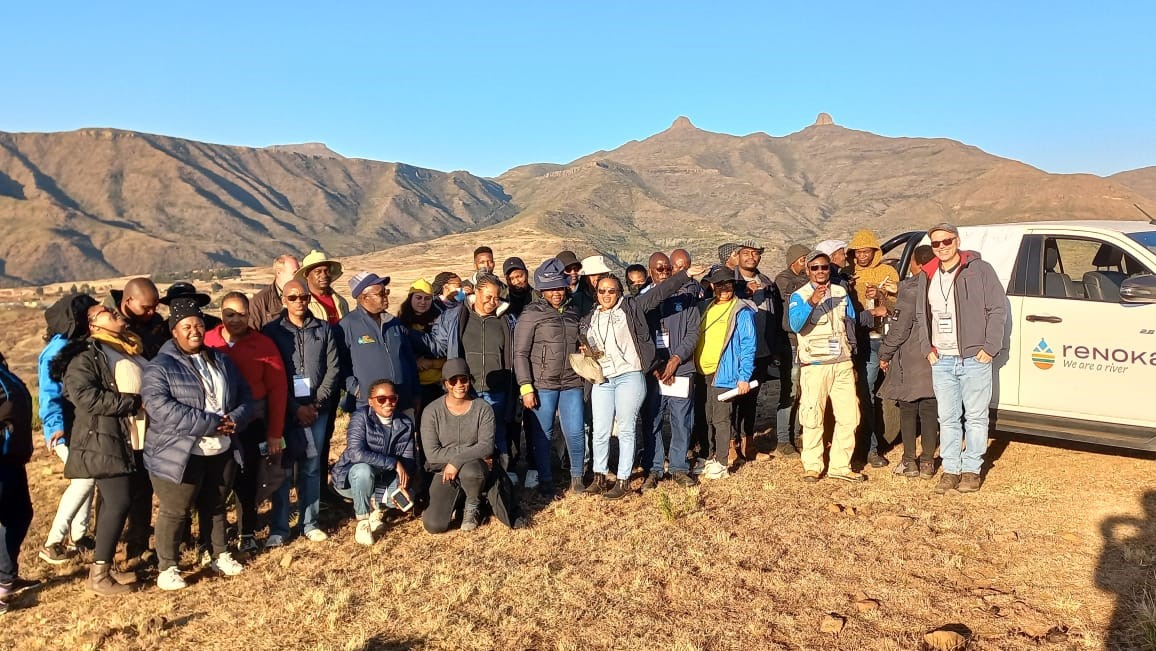
Maseru, 01 July 2022
ReNOKA facilitates the first professional course on ICM.
In an effort to build human capacity for integrated catchment management (ICM) among Lesotho’s natural resources management professionals as part of ReNOKA, WaterNet facilitated the first of a series of 12 planned professional courses from the 29th of June to the 1st of July 2022. Participants for the course were from the ICM implementation partners in Lesotho. The main objective of the course was to develop a common understanding of the ICM concepts and approaches among the partners so that they can implement the broader ReNOKA programme with a shared ICM perspective. This course entitled Conceptualisation and Operationalisation for ICM in Lesotho: ICM Concepts and Approaches, was facilitated by a local Mosotho expert who provided a local perspective and a regional/international expert who provided regional and international perspectives on ICM Concepts and Approaches. The idea behind pairing a Lesotho based expert with a SADC Regional expert was to balance the local understanding of ICM concepts with those from different countries and draw lessons from other countries that have implemented ICM/IWRM and also to transfer the ICM/IWRM facilitation capacity to the Basotho experts. In this course, 40 participants from ICM implementation partners were trained, these include ICM Coordination Unit, GIZ, Catholic Relief Services (CRS), Global Water Partnership Southern Africa, Busara Center for Behavioural Economics, National University of Lesotho, WaterNet, Lesotho Association of Non-Formal Education (LANFE) and Geography and Environmental Movement (GEM).
The first day of training commenced with opening remarks by Mr Makomoreng Fanana (ICM Coordinator) and additional remarks were made by Mr Henrik Hartmann from GIZ, and Dr Khahliso Leketa on behalf of WaterNet Executive Manager Prof Jean-Marie Kileshye Onema. The 1st day discussed the theoretical issues around ICM, and the 2nd day put theory into practice by visiting the ongoing land degradation interventions in Mafeteng, Likhetla Priority Sub Catchments and in Makhalaneng PSC Ha Moitsupeli and Puete wetland. The last day focused on putting together theory and practice in defining ICM Concepts and Approaches with reference to what was observed in the field.
A similar course will be re-run for the natural resource professionals in the ICM line ministries.
The other remaining short professional courses to be implemented before the end of the project will cover topics related to Environmental Analysis using GIS and Remote Sensing, Water Energy and Food Nexus, National and International Law, Gender Mainstreaming Tools in ICM, Financing of Environmental Infrastructure Projects in Lesotho, Conflict management and Negotiation Skills for IWRM/ICM, Policy Planning for Natural Resources Management and Integrated Surface and Groundwater panning and Management.
ReNOKA (‘we are a river’) is a national programme and citizen movement for the restoration of land and water in Lesotho and the Orange-Senqu basin. Support for ReNOKA is provided through a partnership between the Government of Lesotho, the European Union and the German Federal Ministry for Economic Cooperation and Development (BMZ). The EU and BMZ contributions are implemented through a technical assistance project “Support to Integrated Catchment Management in Lesotho” by the Deutsche Gesellschaft für Internationale Zusammenarbeit (GIZ) GmbH.
For more information
Visit the ReNOKA website at www.renoka.org
Engage with us on social media:
Facebook: https://www.facebook.com/renokamovement/
Twitter: https://twitter.com/renoka_movement/
Instagram: https://www.instagram.com/renoka_movement/
LinkedIn: https://www.linkedin.com/company/renokamovement/
Press contacts
Makomoreng Fanana
National ICM Coordinator, ICM Coordination Unit
makomoreng.fanana@renoka.org
Stephan Huppertz
GIZ Programme Manager, Support to Integrated Catchment Management (ICM) in Lesotho
stephan.huppertz@giz.de
‘This publication was produced with the financial support of the European Union and the German Federal Ministry for Economic Cooperation and Development (BMZ). Its contents are the sole responsibility of the Integrated Catchment Management unit and do not necessarily reflect the views of the European Union or the German Federal Ministry for Economic Cooperation and Development (BMZ)’